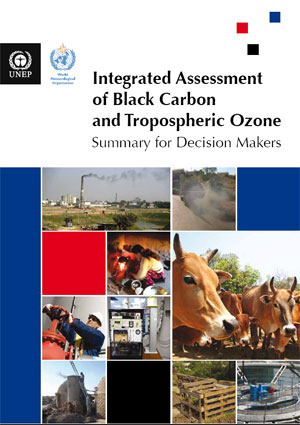
King's College's Professor Martin Williams was a lead author of United Nations Environment Programme (UNEP) assessment of the climate change and health benefits that could accrue from international action to tackle air pollution sources that are also short lived climate forcers.
When thinking about climate change the first thought in people's minds is usually carbon dioxide, and possibly the other so-called 'Kyoto gases' which are strong greenhouse gases but relatively harmless to health and the rest of the environment. But there are other components of the atmosphere which are not only very strong global warming agents but which are also toxic to humans and in some cases to plants. They are known collectively as Short Lived Climate Forcers (SLCFs). Wouldn't it make sense to control these as well as the Kyoto gases? You'd think so, but until now there has been little focus on this important area of overlap between climate change and air pollution. The two most important pollutants in this regard are Black Carbon (the sooty material produced by diesel vehicles and inefficient combustion systems) and ozone both of which are very powerful warming agents. BC is a particularly harmful substance as it can deposit on glaciers and ice-caps, reduce the reflective power of the snow/ice and significantly enhance warming and melting.
So what's being done? The United Nations Environment Programme (UNEP), in co-operation with the World Meteorological Organisation (WMO) has recently completed an Assessment of the problem and shown that swift action on these SLCFs can complement longer term policies on CO2 and the Kyoto gases. The benefits of CO2 reductions will not be felt for some 30 years or so, but reducing the SLCFs now could give an almost immediate benefit and slow the rate of warming until the 'Kyoto gas reductions kick in around 2040. What's more, acting on both the SLCFs and the Kyoto gases leads to a lower long term (2070 and beyond) global temperature than acting on the Kyoto gases alone. But the big difference between the SLCFs and the Kyoto gases is that there are substantial health benefits from reducing them, particularly in Asia where BC emissions from grossly polluting cooking stoves (often indoors) lead to very high levels of particulate matter and have large health impacts. Reductions in ozone levels will also have health benefits and will also reduce crop damage leading to improved food security globally.
What can be done to drive this action? The Assessment report discusses potential ways forward, noting that the Kyoto Protocol revision process is becoming very cumbersome, complex and slow. One suggestion is that rather than relying on this process, some co-ordinated action between air quality agreements already in place around the world might be the best way forward.
Professor Martin Williams said "The report is an important step towards the rational goal of managing air quality and climate change in a co-ordinated and optimal way, something that has yet to happen either globally, or even nationally and regionally."The work as been reported in The Economist (The Economist website)and Science (Science website)
The UNEP Summary for Decision Makers can be found by following the link below .
Item date 09/03/2011
Follow Us
Our newsletter
 Privacy Notice Summary:
Privacy Notice Summary:
- Who this is for: You must be at least 13 years old to use this service.
- What we collect: We store your email address
- Who we share it with: We use "Campaign Monitor" to store it, and do not share it with anyone else.
- More Info: You can see our full privacy notice here
AirMail newsletter
The latest news and research from ERG: View the archive

